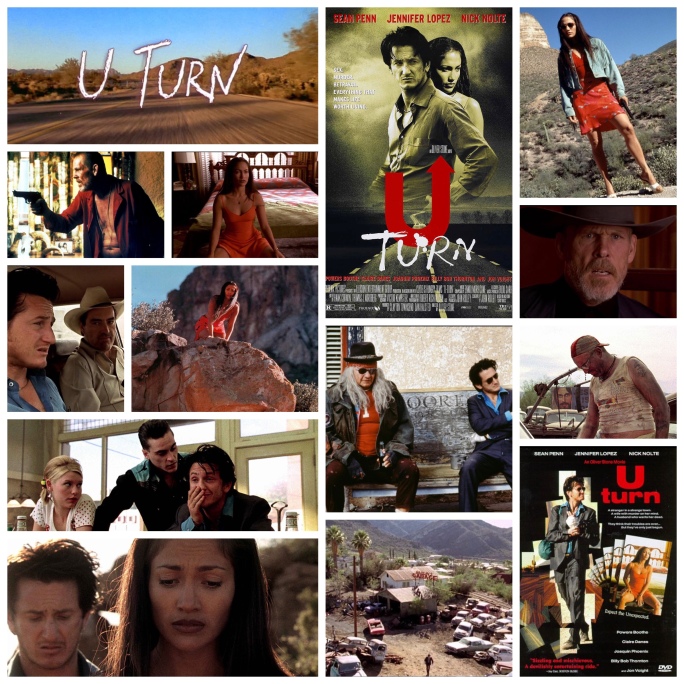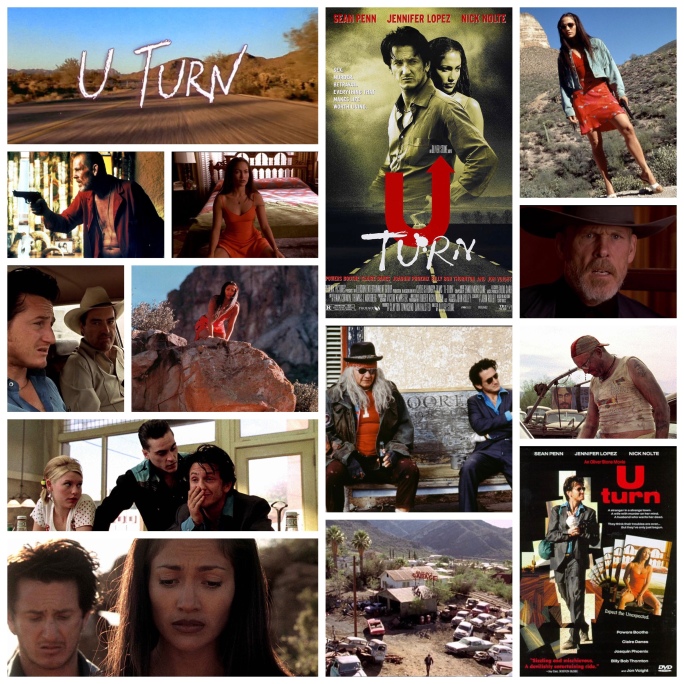
Ever had one of those days where literally everything seems to go wrong and there’s some kind of invisible cosmic force aligned against you? Sean Penn’s Bobby has one of those in Oliver Stone’s U Turn, a deranged, sun drunk parable by way of neo-noir and near Boschian displays of brutal human behaviour punctuated by pockets of the blackest comedy one can find. This is a deliberately, brutally unpleasant slice of nihilism that wouldn’t be easy to swallow were it not so fucking funny, so gorgeously visual, so perkily acted by the knockout ensemble cast and so beautifully scored by Ennio Morricone. Penn’s Bobby has the rotten luck of breaking down in the one horse town of Superior, Arizona, where bumpkin mechanic Billy Bob Thornton takes his sweet time patching up the rig, leaving him to drift about town and get in all sorts of trouble. There’s a rockabilly maniac named Toby ‘TNT’ Tucker (Joaquin Phoenix) who wants Bobby’s head for ‘making time’ with his girl (a loopy Claire Danes). The menacing local Sheriff (Powers Boothe) seems hellbent on doing anything other than protecting and serving. Jennifer Lopez is sultry babe Grace, who snares him up in a dangerously lurid love triangle with her husband Jake (Nick Nolte at his utmost Nick Nolte-iest), who also happens to be her stepfather (!). This all boils into a mucky miasma of murder, violence, sex games, insurance fraud, gas station robberies, betrayal, severed limbs, manipulation and any other noisy calamity you could think of to befall a small town in Arizona that the rest of the world has seemingly forgot. Bobby is on the run from a scary Vegas loan shark (Valery Nikoaelev), but nothing he can do compares to the level of hurt these warped townsfolk inflict upon him, so it’s kind of an out of the frying pan into the fire type scenario. The thing is, Bobby himself is something of a reprehensible scumbag anyways, so there’s a cheeky masochist edge in watching him traverse this dusty, 9th ring of Americana hell and circle an ending of inevitable doom. ‘Treat others how you wish to be treated’ is an adage that almost every single character in the film seems to have sadly forgotten or chose to ignore except one individual, a blind old native man played with disarming truth by Jon Voight. Bobby has several encounters with him, and he’s the only one who isn’t after something, doesn’t display hostility or unkindness, he speaks plainly and offers Bobby bitter pearls of wisdom that ultimately go unheeded. Stone employs the same type of jittery, whacked out visual surrealities he used in Natural Born Killers, a deeply saturated colour palette, tumble dry editing techniques and more breathe life into this vivid version of curdled small town life in the vast, lonely desert. Morricone’s score is a spring loaded jack-in-the-box in areas and a melodic, melancholic lullaby in others, an underrated composition that gives the film an eerie sadness and zany vibration all it’s own. There’s more going on than meets the eye here; at surface level it’s a dark crime comedy with a quirky edge, but both Voight’s character and a few mysterious hints at Lopez’s backstory with the tribes in the region hint at a deeper, darker sense of malice lurking out there with the coyotes, suggestive of an almost mythic aspect. Stone gets high praise for his political dramas, but I’ve always loved him best when he’s doing genre stuff, he’s such an expressive storyteller and the real fruit of his imagination comes out when he’s turned loose. For me this is his second finest work after Natural Born Killers and before Savages, the three films that seem most genuine and celebratory of the medium. In any case, U Turn is a southern fried, asphalt laden, angry, sexy, perverse road trip to sunny noir heaven or hell, and a masterpiece. Watch for neat cameos from Laurie Metcalf, Bo Hopkins, Brent Briscoe, Julie Hagerty and Liv Tyler.
-Nate Hill


